Many teachers struggle with classroom management. From large class sizes to chattiness, to addressing and following up on negative behaviors, and all the other things in between, managing a classroom is challenging and exhausting. But we know that when teachers have their classrooms under control, the magic happens and the show goes on without any interruptions. All kinds of teaching and learning happen simultaneously. A classroom management rock star is one that shows up and plans and delivers rock star lessons. Their students show up and arrive at the show early. They rock alongside their teacher and peers with their wheels turning, discovering, exploring, and learning, chanting for more. They want to come to school for the experience. But how, you ask? It’s all about becoming an effective and proactive, not reactive, classroom manager. Here are 5 sure-fire ways to become a classroom management rock star that ensures you’ll have an engaged crowd every time.
Build Relationships
You can never underestimate the power of building relationships. It serves as the basis for everything related to building classroom community, developing healthy relationships with students, and classroom management. Think about your own personal and professional relationships. I bet you can agree that you are your best for people you like and respect. You probably are even better than your best for people you love or feel appreciated by. Without a doubt, relationships matter, and building them are important, especially in the classroom.
And with building relationships comes investing in students who misbehave. There is so much research that shows that students do not misbehave for no reason. They do not want to make your life harder and do not come to school with an agenda to tick you off. Students misbehave for many reasons and I’m finding that out now as a parent as well. ; ) Chances are that if you build healthy relationships with students, you’ll see fewer negative behaviors. Children behave better for people they like and respect.
Invest some time with students who show negative behaviors by inviting them to have lunch with you or asking them to be your “special” helper. Turn that negative behavior into positive behavior. Kill them with kindness because that’s probably what they need. And once you have a healthy relationship developed with their parents, you can work on the negative behaviors together to support the child.
Model, Teach & Practice Classroom Rules, Routines & Procedures
Teachers who do not invest the time in teaching, modeling, and systematizing all daily tasks will surely struggle with classroom management. When your students know exactly what, why, and how things are done in your classroom, understanding the method behind your organizational madness, it establishes a classroom learning environment that basically will run on its own with minimal interruptions in class. Teaching students, without assuming they know the rules, routines, and procedures from previous years, is really helpful for your students, no matter what age because each year is a brand new year. Be sure to teach your students how you do things in your classroom and why you do it in that way so they understand.
So, what tasks should you systematize? Here are a few important routines and expectations to get you started.
-
Morning Routine
-
Dismissal Routine
-
Lining Up & Walking
-
Stairwell procedures
-
Positive Time Out
-
Buddy Teacher
-
Logical Consequences
-
How to use classroom supplies & materials
-
Bathroom procedures
-
Recess procedures
-
Cafeteria procedures
-
Bus safety
-
Transitions
-
How to clean up work or play centers
See my modeling scripts to help you teach many of the classroom routines above. And don’t forget to reteach and practice these skills throughout the year.
Provide Frequent Positive Feedback
After modeling and teaching expectations and routines, it’s important to give feedback to your students. Positive praise for students demonstrating the expectations is important. Thoughtful Teacher, a classroom management model designed to transform the way teachers manage their students, says that “providing positive feedback is critically important for establishing behavioral expectations for students. When teachers recognize students for achieving desired behaviors, they are clearly distinguishing and reinforcing desired versus undesired behaviors.” It’s all about focusing on the positive behaviors and identifying specific behaviors that students are demonstrating.
Here are a few examples:
Specific Feedback |
General Feedback |
I like the way row 2 is seated silently, each student is looking at me and prepared to take instructions. |
Row 2 looks ready to go. |
Jeremiah is doing an outstanding job of reading and raising his hand when he needs help. |
Jeremiah is doing a great job reading. |
Judy is doing a great job serving as the “timekeeper” for the red group. On at least three occasions, she refocused her group because they were not following the time schedules. |
Judy is doing a great job leading the red groups. |
Melissa did a super job asking her question. Before speaking, she made direct eye contact and proceeded to ask the question using a complete sentence. |
Melissa asks great questions. |
I love the way Rashawn and Troy returned to their seats, tracked the speaker with their eyes, and were prepared to start on their assignments. |
Rashawn and Troy are sitting straight. |
Thoughtful Teacher: 10 Steps to Effective Classroom Management, p. 15
Responsive Classroom uses a similar approach to recognizing positive behaviors with Reinforcing Language. Reinforcing Language identifies and affirms children’s positive behaviors. It helps children recognize exactly what they’re doing well and when they are on the right track. You can read more about this in my post: How Providing Positive Feedback Changes Negative Behavior.
Follow Up on Negative Behaviors
So often as teachers or parents, we fail to follow up on negative behaviors. Sometimes negative behaviors are ignored or unaddressed because it takes so much of our time, energy, and multiple problem-solving strategies. It’s very time-consuming and exhausting and often takes away from daily instruction. That’s why we need strategies in place for following up on negative behaviors that are immediate and consistent because once you let negative behaviors go, you’ll see them spreading like wildfires in your classroom, and even at home.
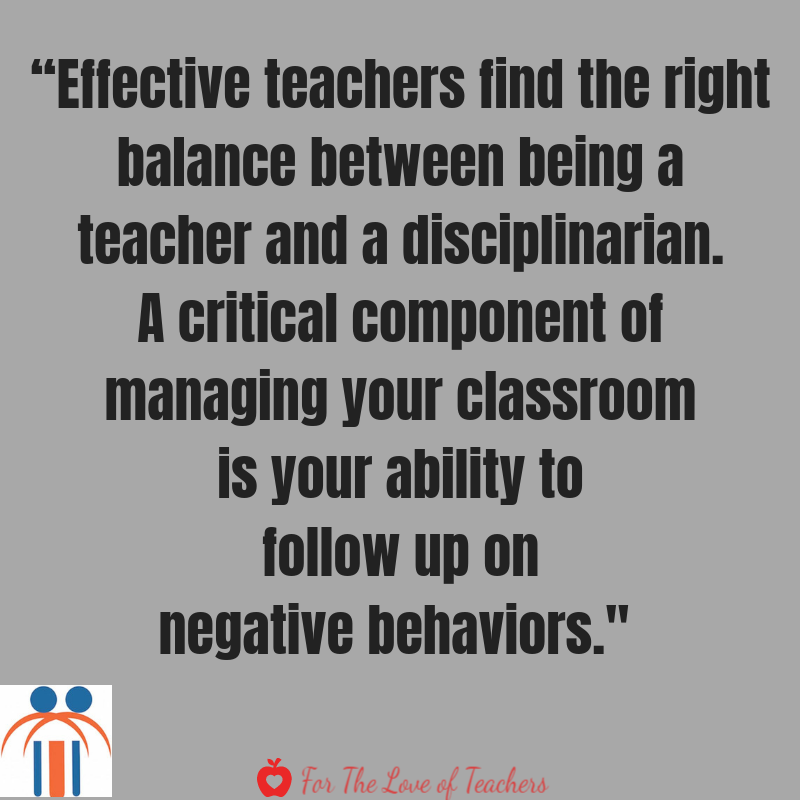
Responsive Classroom’s Logical Consequences are one way to respond to misbehavior that is respectful of children and helps them take responsibility for their actions. Unlike punishment, the primary goal of Logical Consequences is to help children develop inner control by looking closely at their own behavior and learning from their mistakes. Logical Consequences are related, respectful, and reasonable. Making reparations gives children the opportunity to face and fix their mistakes.
Thoughtful Teacher suggests other helpful ways to follow up on negative behaviors. They include, “the teacher’s proximity to students, eye contact, writing the student’s name on the board, and calling the student’s name.”
Here are some other suggestions from Thoughtful Teacher for following up on negative behavior:
-
Conference with the student
-
A phone call to parents
-
Email to parents
-
Lunch Detention
-
Behavior contract
-
Mandatory teacher/parent conference
Whatever you do, always be consistent and immediate with following up on negative behaviors.
Plan Rock Star Lessons
One thing I know about lesson plan design is that if it doesn’t get you excited, it’s definitely not going to get your students excited. There were many times that I literally jumped out of bed in the morning before school because I was super excited about the killer lesson that I had planned for my students that day. The one that I knew would engage them and take their learning to a whole other level. I talk about this in detail in my post, It’s Showtime! Increasing Student Engagement To A Whole Other Level. “Showtime lessons” are lessons that I call interactive, super engaging, and just downright fun. They are your “rock star” lessons and are the ones that get your students’ attention and get them thinking and talking. They make your students thirsty for more. They give your students the experience and the show, not tell. These are the lessons that make your students WANT to come to school and increase student engagement to a whole other level. Check out my post for some of my showtime lessons.
Now of course, not all lessons can be rock star lessons. I mean let’s be real. Teachers don’t always have the time or the resources to put on a rock star lesson every day, in every period, for every subject. It’s just not possible. But there are other ways to plan your lessons so your students are not hitting the “mute” button while you teach. Thoughtful Teacher suggests some practical dos and don’ts for lesson plan design.

Do’s |
Don’ts |
Time lessons to suit students’ attention span |
Create long lessons or parts of lessons that fail to account for students’ attention spans. |
Create engaging lessons for students to include:· Student presentations· Cooperative learning groups· Internet explorations· Group presentations |
Design lessons that include:· Long lectures· Meaningless worksheets· Massive amounts of rote learning activities· Excessive amounts of reading passages followed by multiple-choice/constructed response questions |
Thoughtful Teacher: 10 Steps to Effective Classroom Management, p. 19
Other things to keep in mind while designing your lessons are the learning styles and interests of your students. As you get to know students and build relationships, this should become more clear and easier to implement into your lesson plan design. You can read more about this in my post, Does Your Lesson Plan Design Need a Makeover?
After you implement these 5 strategies you’ll be well on your way to becoming a classroom management rock star. Once you’re a classroom management rock star, you’re always a classroom management rock star and nothing will stop your show from going on. You may even get a standing ovation or two. 😉
What are some other ways in which you manage your classroom like a rock star?
Follow me to be notified when new resources are uploaded to the Shop and join the email list to receive the latest and greatest updates, posts, and some awesome freebies!
If you like it, then pin it,
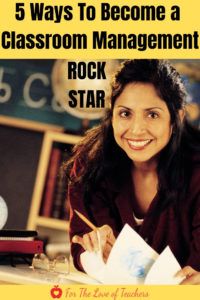


Christine Weis is a passionate educator, classroom management coach, wife, and mom of two busy boys. She enjoys teaching, writing, and creating resources for teachers.
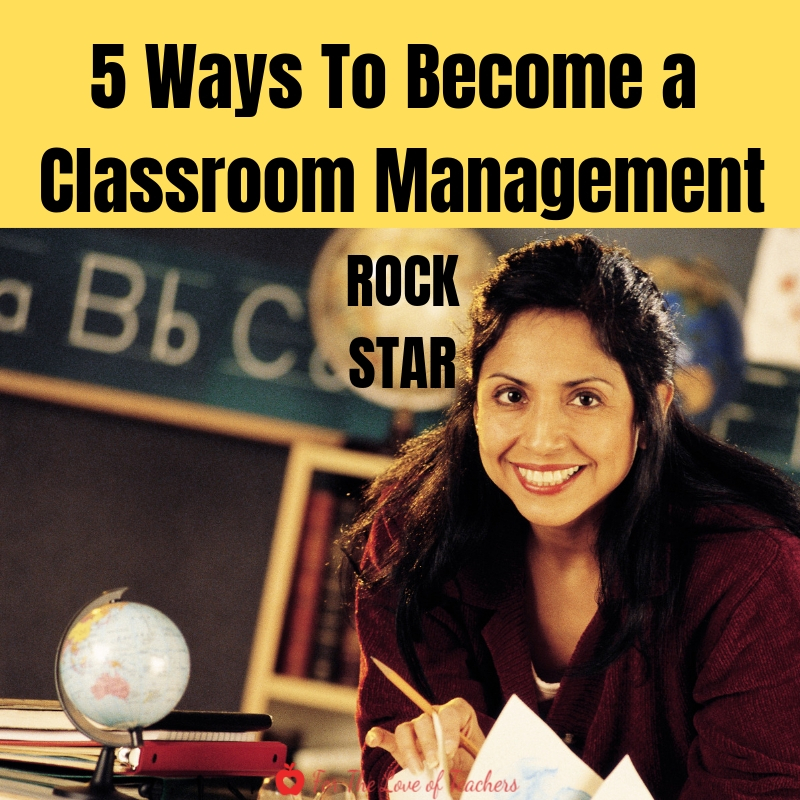
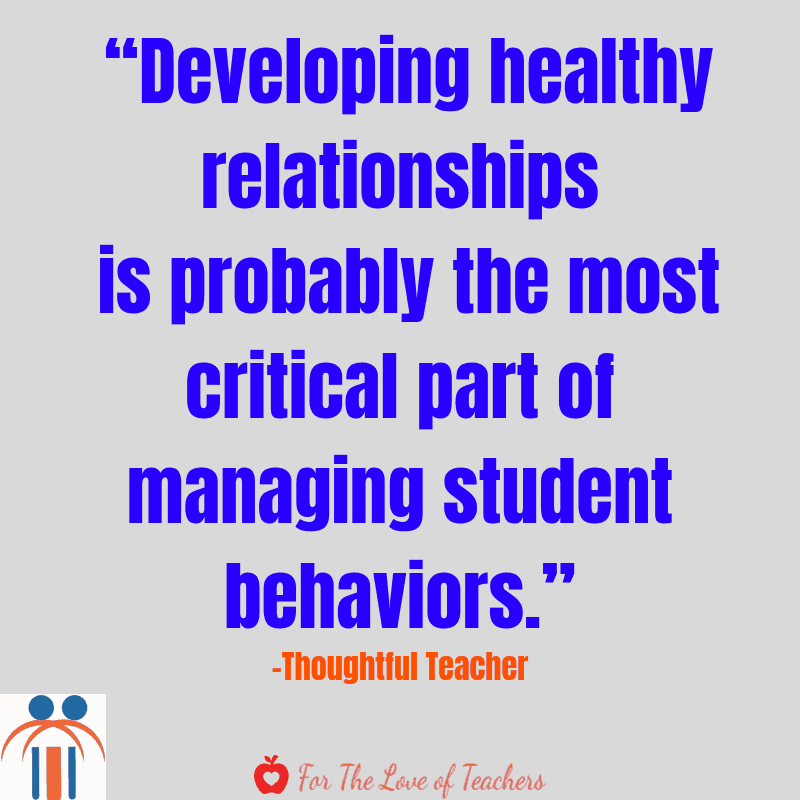
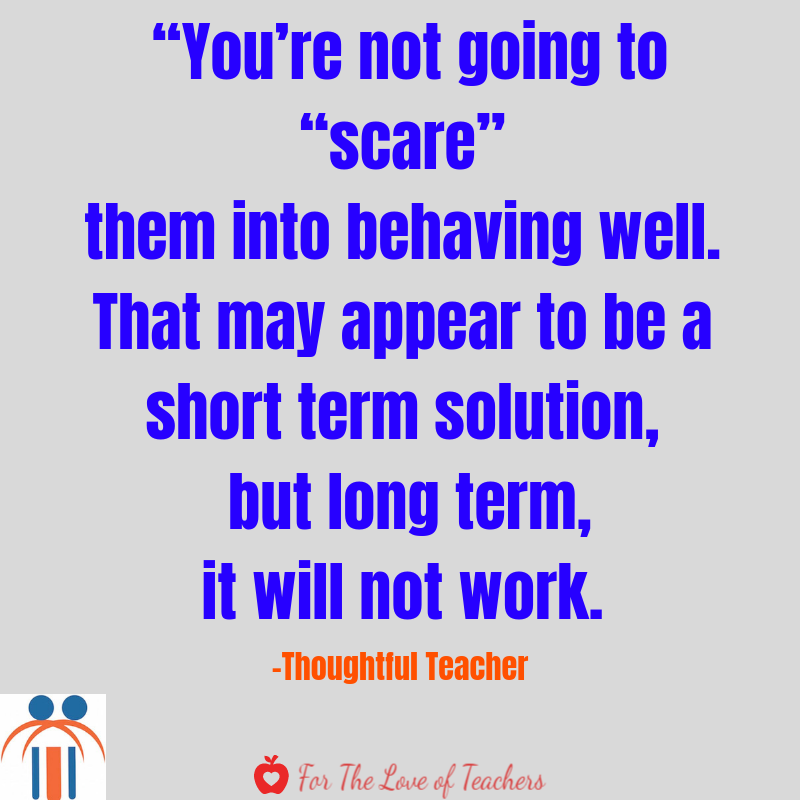




This is some really great advice. I know that getting relationships in the classroom with the kids can be tough. It definitely makes things easier though.
It really can be tough! Sometimes relationships “bloom” and develop later in the school year. It definitely does make the days a lot easier when more teaching and learning can happen. Thanks for reading!
Christine at For The Love of Teachers
These are great tips on how to manage and control the class. It will be helpful to less experienced professors and teachers.
Thanks! Ah, yes…new teachers need a lot of support with classroom management. You don’t learn how to manage a class in college that’s for sure! 😉
Thanks for reading!
Christine at For The Love of Teachers
I have said this before: I don’t envy teachers. Classroom management is a hard job and a rewarding one I know. Just seems like such a challenge managing so many personalities and behaviours too.hats off to teachers .
Thank you! 😉 It’s very challenging and that is why you need to be on your game day 1. Knowing and using the right strategies helps! Thanks for reading!
Christine at For The Love of Teachers
Teaching is such a wonderful profession. Your insights on how to keep a class engaged and under control are invaluable.
Thank you so much! I appreciate your kind comment. Thanks for reading!
Christine at For The Love of Teachers
Great tips for taking control of the class. Thank you for sharing!
Thank you so much! And thanks for reading!
Christine at For The Love of Teachers
This is so important! I can apply this to even my role as a mother! Love how you emphasized the importance of building HEALTHY relationships!
Ain’t that the truth about applying this to motherhood. I wear the mom hat in the classroom too. 😉 Building healthy relationships really do matter. Thanks for reading!
Christine at For The Love of Teachers
These tips are really good. I have substituted before and having this info would have been amazing!
Thank you! Substituting is no easy day’s work. Thanks for reading!
Christine at For The Love of Teachers
These are really helpful tips for teachers. Also a great guide for parents to understand about a child’s behavior towards school and their teachers.
Thank you! That’s a good point! Communicating with parents about classroom management is important for them to know and understand how it affects teaching and learning. Thanks for reading!
Christine at For The Love of Teachers
Building a relationship with the students seems to be the best way. I noticed before that even my unruly classmates would listen to our teacher if there’s a bond built with them. :0)
Definitely! Get them to like you and then to respect you and it can do wonders for those students academically and socially. Thanks for reading!
Christine at For The Love of Teachers
I agree with providing frequent positive feedbacks as it encourages students to behave in a way expected from them. 🙂
Yes! Exactly! When expectations are clear students will know how to behave and what they can’t get away with. Thanks for reading!
Christine at For The Love of Teachers
These are some great tips for classroom management success. I am in awe of our teachers and how many students they teach in their classrooms.
Thank you! Class sizes are getting larger so teachers have to be on their game at all times to be able to teach and for students to be able to learn. Thanks for reading!
Christine at For The Love of Teachers
Once you master the art of management m, you can master a classroom and many other things. Great insight!
YES! Exactly! Thanks for reading!
Christine at For The Love of Teachers
This is such a great post. I can see how having good relationships can only work in a teacher’s favor. It’s like that in any group setting, really.
Thank you! Building relationships really do matter and are the number one way to get students to buy in. It’s a win-win for both teachers and students. You’re right, even in the workplace, this makes a huge difference. Thanks for reading!
Christine at For The Love of Teachers
So true! It’s the same in the workplace as well. Building relationships really make a difference. Thanks for reading!
Christine at For The Love of Teachers